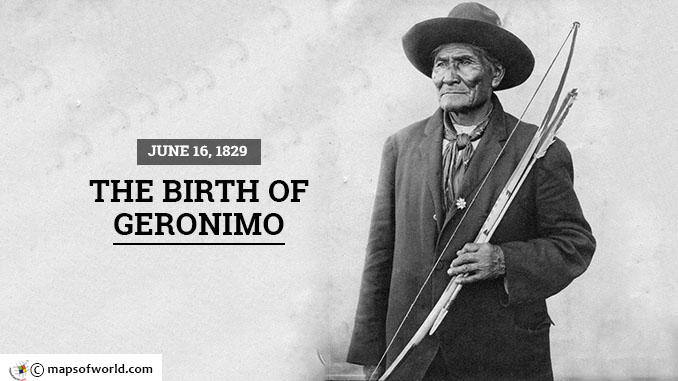Outlaw. Renegade. Warrior. One of the most famous figures in the long and sordid history of the American West was born on June 16th, 1829 somewhere along the Gila River. The exact location is unknown, leading to a dispute between the cities of Clifton, Arizona and Silver City, New Mexico – both wish to claim the Apache hero as a native son for tourism purposes. Geronimo’s story is one synonymous with the encroachment of European settlers and Mexican soldiers: angry at the disrespect and lawlessness exhibited by these unwelcome populations on his native lands, tribes often retaliated with murderous rampages of their own. After his mother, wife and three children were cut down in a raid by the Mexican army in March 1858 at Kas-Ki-Yeh, Geronimo seethed with fury. Directed by Bedonkohe chief Mangas Coloradas to join another legendary figure, Cochise, in avenging the losses inflicted by their enemies, he quickly earned a reputation for bravery and ruthlessness in battle. To some, this fearless quality resulted in the common name history knows him by. Called Goyaalé (“one who yawns”) by his mother and father, scholars debate whether “Geronimo” was the result of Mexican adversaries being unable to pronounce his name correctly or if, terrified by his willingness to attack armed only with a knife, they cried out to Saint Jerome for protection. Regardless, what cannot be argued is the success Geronimo had in evading capture. For nearly 30 years, he roamed around the desert of the modern southwestern United States and northern Mexico with two dozen other warriors, leading them on strikes against towns and settlements as retribution for the treatment of his fellow Apaches. The attacks were deeply personal for Geronimo, as he said in his 1905 autobiography: “I have killed many Mexicans; I do not know how many, for frequently I did not count them. Some of them were not worth counting. It has been a long time since then, but still I have no love for the Mexicans. With me they were always treacherous and malicious.” As he continued to avoid capture despite being outnumbered, the press began to catch on and Geronimo quickly ascended to legendary status amongst the public, especially white settlers that feared he might prey upon them next. He escaped the American army. He evaded Mexican soldiers. It seemed he would remain elusive forever – even escaping from a cave outside present-day Phoenix without any apparent exit (still known as Geronimo’s Cave to this day). Finally, in September 1886, Lieutenant Charles B. Gatewood of the US Army’s 4th Cavalry gained the upper hand. Dogged in his pursuit of the Native American warrior, Gatewood hardly allowed the band of rebels time to rest or eat. Geronimo, in finally surrendering, gave his opponent credit for using superior tactics and appreciated the Lieutenant’s consideration in honoring Apache traditions. Arriving at Skeleton Canyon, Arizona on September 4th, Geronimo laid down his arms in front of General Nelson Miles, ending life on the run. Treated as a prisoner of war, he was moved to Fort Sam Houston for six weeks before a transfer to Fort Pickens in Florida. In mid-1887, he was reunited with his family at Mount Vernon Barracks outside of Mobile, Alabama. There they remained until 1894, when they relocated for the last time to Fort Sill, Oklahoma. As he aged, his celebrity grew. He participated in the 1904 World’s Fair in St. Louis and rode in President Theodore Roosevelt’s inauguration parade during early 1905. Nearing his 80th birthday in February 1909, Geronimo was thrown from his horse during an evening ride. Undiscovered until the next morning, he contracted pneumonia and died on February 17th. With his strength ebbing away, he is said to have shared his last words with is nephew: “I should have never surrendered. I should have fought until I was the last man alive.” “I should have never surrendered. I should have fought until I was the last man alive.”
June 16, 1829 – The Birth of Geronimo
Outlaw. Renegade. Warrior. One of the most famous figures in the long and sordid history of the American West was born on June 16th, 1829 somewhere along the Gila River.…
